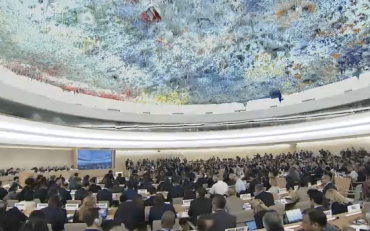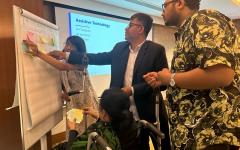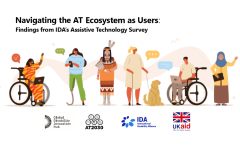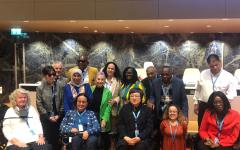On 28 September 2017, the Human Rights Council (HRC) approved the Resolution on Mental Health and Human Rights. The Resolution was proposed by the Permanent Missions of Brazil and Portugal, with the support of 59 co-sponsors to date (see complete list below). This resolution was built through an open and constructive negotiation process, with the aim to ensure its adoption by consensus.
The International Disability Alliance (IDA) was present during all the informal consultations and supported the UN member states with technical advice, following expert guidance from its member - the World Network of Users and Survivors of Psychiatry (WNUSP), and also from supporting organization TCI - Asia.
>> Download the Resolution in Chinese, English, French, Russian and Spanish
>> Download the Structure of the Resolution on Mental Health and Human Rights
While HRC resolutions are not legally binding under the International Law - but soft law - they represent strong political and moral expressions from UN member States.
On the follow up of its adoption, the Ambassadors of Brazil and Portugal, in addition to the Chair of the CRPD Committee and the co-chair of WNUSP shared with IDA on the importance of this Resolution.
The Ambassador of Brazil, Her Excellency Ms Maria Nazareth Azevêdo, highlighted that: “This resolution recognizes the need for a paradigm shift concerning mental health policies and practices. A human rights-based perspective, which respects, on an equal basis, the will and preferences of all persons, is very much welcome in this context.”
Mr Salam Gomez, co-chair and CEO of the WNUSP stressed that: “WNUSP congratulates the important work of effective consultation that was developed in an intense way around the Resolution of Mental Health and Human Rights issued by the Human Rights Council, an important exercise of participation.” According Mr Gomez, “this resolution constitutes a valuable political and social advocacy tool that should be used to guarantee the rights of users of mental health services and / or persons with psychosocial disabilities in different regions of the world.”
The Ambassador of Portugal, His Excellency Ambassador Pedro NunoBártolo, recalled: “Striving for a world where aggravated forms of discrimination, stigma, violence and abuses that affect the enjoyment of human rights in the context of mental health are avoided and proscribed: this is what this groundbreaking Human Rights Council resolution initiated by Portugal and Brazil (the second such initiative on this subject in the space of fifteen months) is all about.”
In addition, Ambassador Bártolo highlighted that: “This resolution definitely affirms the importance of adopting a human rights approach in the context of mental health. It underscores the need to ensure access of persons with mental health conditions and psychosocial disabilities to a range of support services which are people-centered and based on respect for human rights, so that they can live independently, be included in the community, exercise their autonomy and agency, participate meaningfully in, and decide upon, all matters affecting them and have their dignity respected. It calls upon member States to abandon all practices that fail to respect the rights, will and preferences of all persons and that lead to power imbalances, over-medicalisation, stigma and discrimination in mental health settings, and acknowledges the momentum created for deinstitutionalization. This resolution strongly encourages States to support persons with mental health conditions or psychosocial disabilities to empower themselves, to know and demand their rights, including through health and human rights literacy, and to provide human rights education and training, inter alia for health workers.”
Yet, it is important to note that, during its negotiation, several States proposed derogatory language and struggled in recognizing that all persons with psychosocial disabilities should enjoy equal recognition before the law on an equal basis with others and that, in some cases, forced treatment and forced medication should be allowed. Thanks to strong commitment from main sponsors (Portugal and Brazil), support from Mexico and Australia, and technical advice of the mandate of the Special Rapporteurs on the Rights of Persons with Disabilities and of Health, and in addition to the WHO, the human rights-based language was retained in the resolution.
As underscored by Ms Theresia Degener, Chair of the CRPD Committee: “It is appreciated the language calling for community-based, people-centred services and supports that do not lead to over-medicalization and inappropriate treatments. However, I am still concerned with the strong resistance from Member States, during the informal negotiations, to include clear mention on the prohibition of forced treatment and confinement. I hope it can evolve next year in the direction paved by the CRPD and the General Comment 5 of the CRPD Committee on the Article 19 of the Convention”.
On behalf of the WNUSP, Mr Gomez stressed: “We want to thank all the people that worked to make this Resolution on Mental Health and Human Rights a reality; allowing our voices to be heard; considering our contributions, and, indeed, making reality the ‘nothing about us without us!”
The HRC requested the Office of the High Commissioner for Human Rights (OHCHR) to organize a consultation lasting one and a half days to discuss all the relevant issues and challenges pertaining to the fulfilment of a human rights perspective in mental health, the exchange of best practices and the implementation of technical guidance in this regard. It is expected that this consultation will take place in April or May 2018. For further information contact tfleury [at] ida-secretariat.org.
States co-sponsors of the Resolution on Mental Health and Human Rights 2017, by alphabetical order:
- Andorra
- Angola
- Argentina
- Australia
- Austria
- Belgium
- Bolivia (Plurinational State of)
- Bosnia and Herzegovina
- Botswana
- Brazil
- Bulgaria
- Cabo Verde
- Canada
- Chile
- Colombia
- Croatia
- Cyprus
- Denmark
- Dominican Republic
- Ecuador
- Equatorial Guinea
- Fiji
- Finland
- France
- Georgia
- Germany
- Greece
- Guatemala
- Haiti
- Honduras
- Ireland
- Italy
- Japan
- Lithuania
- Luxembourg
- Malta
- Mozambique
- Panama
- Paraguay
- Peru
- Philippines
- Poland
- Portugal
- Republic of Korea
- Romania
- San Marino
- Spain
- Sri Lanka
- State of Palestine
- Sweden
- Switzerland
- Thailand
- the former Yugoslav Republic of Macedonia
- Timor-Leste
- Tunisia
- Turkey
- Ukraine
- United Kingdom of Great Britain and Northern Ireland
- Uruguay






